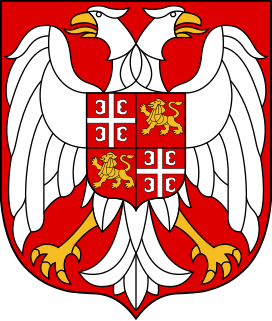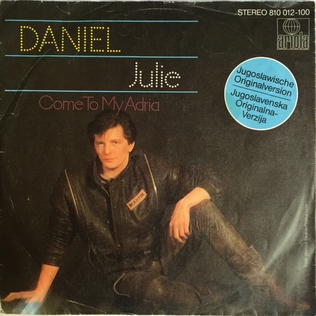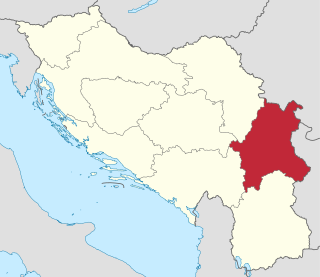 W
WThe 8th Dalmatian Shock Corps was a corps of the Yugoslav Partisans formed on 7 October 1943. It was formed from the 9th, 19th, 20th, and 26th Dalmatian divisions. Upon creation it had 13,049 soldiers. The corps operated in the Independent State of Croatia, Governorate of Dalmatia, and Adriatic Littoral, where they fought Italians, Chetniks, the Ustaše, and Germans.
 W
WParliamentary elections were held in Yugoslavia on 11 December 1938. The result was a victory for the governing Yugoslav Radical Union, which won 306 of the 373 seats in Parliament.
 W
WThe 1992 Yugoslav Constitution was the constitution of the Federal Republic of Yugoslavia. It came into effect on 27 April 1992.
 W
WThe Athletic Federation of Yugoslavia was the governing body for the sport of athletics in Yugoslavia. It was founded on 11.IX 1921 in Zagreb as Yugoslav Light Athletics Federation.
 W
W"Brazil" was a song of the Eurovision Song Contest 1991, performed in Serbo-Croatian by Bebi Dol, representing Yugoslavia.
 W
W"Brez besed" was the Yugoslav entry to the Eurovision Song Contest 1966, composed by Mojmir Sepe and Elza Budau and performed by Berta Ambrož in Slovene.
 W
W"Ciao, amore", listed as simply Ciao amore in the official Eurovision website, was the Yugoslav entry in the Eurovision Song Contest 1984, performed in Serbo-Croatian by the Yugoslav duo Vlado & Isolda and written by the Montenegrin songwriters Slobodan Bučevac and Milan Perić. At the close of voting, it received 26 points, placing 18th in a field of 19.
 W
W"Dan ljubezni" is a song performed in Slovene by the band Pepel in kri. It was the Yugoslav entry song in the Eurovision Song Contest 1975, and it marks the fourth and final time the Socialist Republic of Slovenia represented the whole of Yugoslavia at Eurovision. The music composition was written by Tadej Hrušovar, lyrics were written by Dušan Velkaverh and arranged by Dečo Žgur.
 W
W"Džuli" was the Yugoslav entry in the Eurovision Song Contest 1983, performed in Serbo-Croatian by Montenegrin singer Daniel Popović. It was performed 12th on the night, following the Netherlands' Bernadette with "Sing Me a Song" and preceding Cyprus' Stavros & Constantina with "I Agapi Akoma Zi". At the close of voting, it received 125 points, and came 4th in a field of 20.
 W
WThe Federal Executive Council was the executive body of the Socialist Federal Republic of Yugoslavia (S.F.R.Y) responsible for state affairs and for supervising the implementation of laws. It consisted of up to 15 members elected by the Federal Assembly for a four-year term and the presidents of executive councils of republics and provinces. The Federal Executive Council played an important role in the Government of the S.F.R.Y from its creation in 1953 until the breakup of Yugoslavia in 1992.
 W
W"Gori vatra" was the Yugoslavian entry in the Eurovision Song Contest 1973, performed in Serbian by Zdravko Čolić.
 W
W"Hajde Da Ludujemo" was the Yugoslav entry to the Eurovision Song Contest 1990, held in Zagreb, SFR Yugoslavia.
 W
W"Halo, Halo" was the Yugoslavian entry in the Eurovision Song Contest 1982, performed in Serbo-Croatian by Aska.
 W
WIndexi was a Bosnian and former Yugoslav rock band popular in Yugoslavia. It formed in 1962 in Sarajevo, Bosnia and Herzegovina, and disbanded in 2001 when singer Davorin Popović died. Some of their most notable songs are "Svijet u kome živim" and "Negdje u kraju, u zatišju" with lyrics by Želimir Altarac Čičak,"Plima", "Sve ove godine", "Sanjam" and "Bacila je sve niz rijeku", which was later covered by many other ex-Yugoslavian groups, notably Crvena jabuka.
 W
W"Ja sam za ples" was the Yugoslav entry to the Eurovision Song Contest 1987, composed by Rajko Dujmić and Stevo Cvikić and sung by Novi Fosili in Croatian.
 W
WSwabian-German Cultural Association or Kulturbund was a cultural, social, and political organization of the ethnic Germans in Kingdom of Yugoslavia. During World War II, the Kulturbund promoted Nazism in the Yugoslavian German community and collaborated with the German occupational authorities.
 W
WLejla, or Leila as it is listed in the official Eurovision website, was the Yugoslavian entry in the Eurovision Song Contest 1981, performed in Serbo-Croatian by Seid Memić (Vajta).
 W
W"Mangup" was the Yugoslav entry to the Eurovision Song Contest 1988, composed by Rajko Dujmić and Stevo Cvikić and sung by Srebrna Krila in Croatian.
 W
WThe Morava Banovina or Morava Banate, was a province (banovina) of the Kingdom of Yugoslavia between 1929 and 1941. This province consisted of parts of present-day Central Serbia and it was named after the Morava Rivers. The capital city of the Morava Banovina was Niš.
 W
W"Muzika i ti" was the Yugoslavian entry in the Eurovision Song Contest 1972, performed in Croatian by Tereza Kesovija.
 W
W"Ne mogu skriti svoju bol" was the Yugoslavian entry in the Eurovision Song Contest 1976, performed in Bosnian by Ambasadori. The song was performed eighteenth and last on the night. At the close of voting, it had received 10 points, placing 17th in a field of 18.
 W
W"Pozdrav svijetu" was the Yugoslavian entry in the Eurovision Song Contest 1969, performed in Serbo-Croatian by Ivan and the band M´s.
 W
WSerbia and Montenegro made their Eurovision Young Musicians debut and only participation at the Eurovision Young Musicians 2006, where they failed to qualify for the final.
 W
WThe Sisak People's Liberation Partisan Detachment, also known as the 1st Sisak Partisan Detachment, was the first armed anti-fascist resistance unit formed by a resistance movement in occupied Yugoslavia and Europe during World War II.
 W
WThe Titovka was a famous green side cap characteristic of the Yugoslav Partisans during World War II, and later the Yugoslav People's Army, hence known as the JNA cap. It was based on the Russian pilotka, and often had the red star badge on the front, either made out of red felt or an enamelled red star with sickle and hammer. It was named after the Partisan leader and President of Yugoslavia, Marshal Josip Broz Tito. It was used by the Union of Pioneers of Yugoslavia, in white or blue colour
 W
W"Tvoj dječak je tužan" was the Yugoslavian entry in the Eurovision Song Contest 1971, performed in Croatian by Krunoslav Slabinac.
 W
W"Vse rože sveta" was the Yugoslav entry to the Eurovision Song Contest 1967, composed by Urban Koder and Milan Lindič and performed by Lado Leskovar in Slovene.
 W
WThe Yugoslav Radical Union was the ruling far-right party of Yugoslavia from 1934 until the 1941 coup d'état.
 W
WYugoslavia has participated in the Eurovision Young Dancers 3 times.
 W
WYugoslavia participated in the Eurovision Young Musicians 4 times, making their debut in 1986 and making an appearance at every contest until its last in 1992.
 W
W"Željo moja" was the song which represented Yugoslavia at the Eurovision Song Contest 1986 in Bergen, Norway. It was performed by the Croatian singer Doris Dragović who finished eleventh on the night.